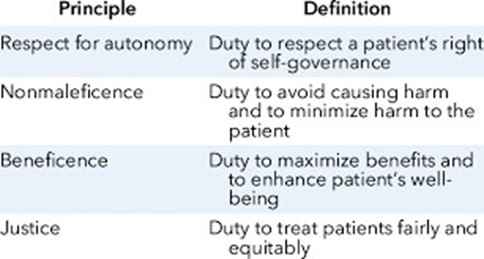A nurse manager is reviewing clients' rights with the nurses on the unit. The nurse manager should tell the nurses that informed consent promotes which of the following ethical principles?
Autonomy
Nonmaleficence
Justice
Fidelity
The Correct Answer is A
- A. Autonomy is the ethical principle that respects the right of clients to make their own decisions and choices regarding their health care. Informed consent is a process that ensures that clients are fully informed of the benefits, risks, alternatives, and consequences of a proposed treatment or procedure, and that they voluntarily agree to it.
- B. Nonmaleficence is the ethical principle that obliges health care providers to do no harm to clients, either intentionally or unintentionally. Informed consent does not directly promote this principle, although it may help to prevent harm by disclosing potential risks and complications.
- C. Justice is the ethical principle that requires fair and equal treatment of all clients, regardless of their personal characteristics, preferences, or values. Informed consent does not directly promote this principle, although it may help to ensure that clients are not coerced or manipulated into accepting a treatment or procedure that they do not want or need.
- D. Fidelity is the ethical principle that requires health care providers to be faithful and loyal to their clients, and to honor their commitments and promises. Informed consent does not directly promote this principle, although it may help to establish trust and rapport between clients and providers.

Nursing Test Bank
Naxlex Comprehensive Predictor Exams
Related Questions
Correct Answer is B
Explanation
- A. Adjust the crutches for comfort as needed. This is incorrect because the crutches should be adjusted to fit the client's height and arm length, and should not be changed without proper guidance.
- B. Use a three-point gait. This is correct because this gait allows the client to avoid putting weight on the affected leg and maintain balance and stability.
- C. Wear leather-soled shoes. This is incorrect because leather-soled shoes can be slippery and increase the risk of falls and injuries.
- D. Advance the affected leg first when walking upstairs. This is incorrect because the client should advance the unaffected leg first when walking upstairs, and the affected leg first when walking downstairs.
Correct Answer is ["A","B","C","D"]
Explanation
- A: Correct. Firmly massaging the uterine fundus helps to contract the uterus and reduce bleeding.
- B: Correct. Providing emotional support helps to calm the client and reduce anxiety, which can worsen bleeding.
- C: Correct. Administering oxygen helps to improve tissue perfusion and oxygenation, which can be compromised by blood loss. Weighing the perineal pads helps to quantify the amount of blood loss and monitor for hemorrhage.
- D: Correct. Inserting an indwelling urinary catheter helps to empty the bladder and allow the uterus to descend and contract more effectively. Administering methylergonovine helps to stimulate uterine contractions and control bleeding.
- E: Incorrect. Administering terbutaline is contraindicated in this situation, as it relaxes the uterine smooth muscle and increases bleeding.
Whether you are a student looking to ace your exams or a practicing nurse seeking to enhance your expertise , our nursing education contents will empower you with the confidence and competence to make a difference in the lives of patients and become a respected leader in the healthcare field.
Visit Naxlex, invest in your future and unlock endless possibilities with our unparalleled nursing education contents today
Report Wrong Answer on the Current Question
Do you disagree with the answer? If yes, what is your expected answer? Explain.
Kindly be descriptive with the issue you are facing.
